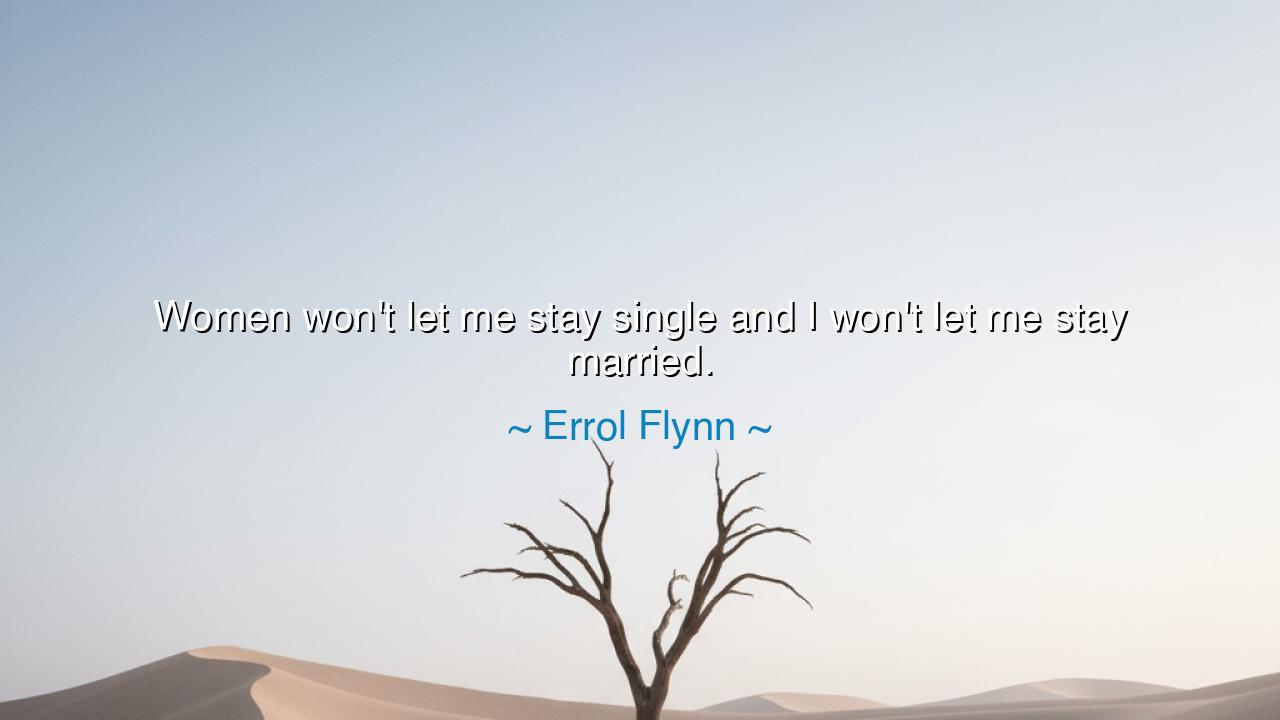
Women won't let me stay single and I won't let me stay married.






The words of Errol Flynn shimmer with irony and self-revelation: “Women won’t let me stay single and I won’t let me stay married.” In these few lines, the great swashbuckling actor of Hollywood confesses the turmoil of his own desires and the irresistible pull of others. He paints himself as a man caught between two currents—one drawn toward the embrace of women, the other driven by a restless spirit that cannot be bound. It is both boast and lament, a mirror of his turbulent life.
Flynn was famed in the 1930s and 40s not only for his roles as a daring hero, but for his offscreen adventures that scandalized and fascinated the public. To say that women would not let him stay single is to admit his magnetic charm, the allure that drew admirers wherever he went. Yet to add that he himself would not let him stay married is to confess his own weakness, his inability to endure the bonds of commitment. It is the eternal conflict between freedom and fidelity, played out in the theater of one man’s life.
History has often told this tale before. The great poet Lord Byron, whose passions shook Europe, lived much the same way—beloved by women, but unable to remain bound to one alone. His affairs became legend, and like Flynn, he lived as though torn between destiny and desire. Both men carried within them a fire that consumed not only themselves but those who came near, leaving behind brilliance and wreckage in equal measure.
Flynn’s words also reveal something of the human condition. To be single is to long for love; to be married is to feel the weight of chains. Many wrestle with this paradox, though few speak it so plainly. The actor’s jest contains a sorrow: that he could never reconcile the two, never find peace in either state. His life became a dance between passion and restlessness, a struggle as old as humanity itself.
So let the children of the future learn: the power of desire is both blessing and curse. To be forever pulled between solitude and union is to live in a storm without harbor. Flynn, by his own words, admits that he never found the calm of balance, only the thrill of chaos. His tale is a warning—that charm and passion may bring joy, but without discipline, they may also leave a man wandering forever between freedom and belonging.






HLHieu Lam
Errol Flynn’s statement is an interesting reflection on the push and pull between societal norms and personal desires. He seems to be acknowledging that, sometimes, we feel pulled in different directions by expectations—whether from others or ourselves. Is there a deeper commentary here about freedom versus commitment? How do we find a balance between satisfying external expectations and staying true to our own needs and desires in relationships?
THTran Huyen
Flynn’s quote is playful but also poignant, capturing the paradox of relationships—feeling pulled in different directions by both external influences and personal desires. How often do we end up in relationships because of societal pressure rather than personal choice? How do we navigate the tension between being happy in a relationship and maintaining the freedom that being single can offer? Can these two desires coexist peacefully?
MNDao Mnh Ngoc
Errol Flynn’s quote seems to capture the complexity of relationships—how sometimes, neither being single nor married feels entirely satisfying. This makes me wonder: can anyone truly find balance in relationships when external pressures, like societal expectations or other people’s desires, play such a huge role? Do we ever truly get to decide for ourselves whether to stay single or married, or is that always influenced by others?
QTQuy Tam
Errol Flynn’s words feel almost tongue-in-cheek, highlighting the push and pull between wanting personal freedom and the pressures of societal expectations, especially in relationships. But what does it really mean to feel torn between staying single or staying married? Does this conflict arise from external expectations, or is it more of an internal struggle between independence and companionship? How often do we see this dynamic in modern relationships?
ATNguyen Anh Thu
This quote from Errol Flynn seems to touch on the conflict between personal freedom and the expectations placed on relationships. It’s as if he feels caught between societal norms and his own desires. Do we place too much emphasis on whether someone is single or married? Shouldn’t the focus be more on whether the individual is happy and fulfilled, regardless of their relationship status?